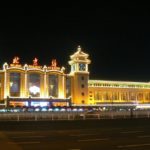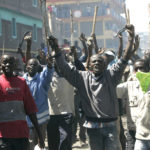Intro: A short commentary on my second exposure to this squeaky-clean city-state where lesbigays are clearly present, well-dressed–and with few places to go. Gay life might be narrow and suppressed here, but the overall quality of life in Singapore makes it quite bearable.
Also see:
Gay Singapore Stories
Gay Singapore News & Reports 2000 to present
Gay Singapore Photo Galleries

By Richard Ammon
February 1997
Updated March 2006
Social Matters
Walking down Singapore’s fashionable and upscale Orchard Road reveals an affluent and sophisticated society drenched in all the accouterments and merchandise of modern design and technology. The streets are clean, the international boutiques are engorged and shiny cars whisk along the boulevard toward multinational corporate skyscrapers and countless trendy cafe-restaurants.
Signs of health and affluence are pervasive: plentiful food, clean water, sparkling new shopping malls, good air quality, a busy harbor and low unemployment. It is the good life–among the best Asia has to offer.
My friend Robert typifies the image of an efficient, well groomed, middle class young Singaporean professional (of Chinese descent) absorbed in the commercial and social fabric of this city state of 3 million people. He strides along Orchard Road glancing at the latest window displays and suddenly stops to read a large Levi’s ad in one of the windows.
 He laughs and turns to me: "Now this is what I am talking about.", pointing to the bright yellow sign displaying a bare-chested young man in 501’s, hands tugging on a lowered belt line while looking at another similarly clad man standing nearby. The caption behind them says, "Are You Straight?" in bold print, along with smaller letters asking "Very loose? Too tight? Very relaxed?–Levi’s".
He laughs and turns to me: "Now this is what I am talking about.", pointing to the bright yellow sign displaying a bare-chested young man in 501’s, hands tugging on a lowered belt line while looking at another similarly clad man standing nearby. The caption behind them says, "Are You Straight?" in bold print, along with smaller letters asking "Very loose? Too tight? Very relaxed?–Levi’s".
Robert is a gay Singaporean who is keenly attuned to the appearances as well as the shadows of his native culture. He knows well that such appearances are deceptive. "Gay people live between the lines of respectability and risk. This is an oppressive straight society and yet there is a gay presence everywhere you look–like that ad."
Robert is well positioned, as a gay man, to see the abundance of life here and to see the surrounding proscriptions; he sees the good life and he sees the censorship that curtails (or shapes?) that good life.
Legal Matters
 Singapore law is known for its austerity and its enforcement is well known for its severity. On the immigration card for visitors entering Singapore, there is a bold notice in red: "death for drug traffickers under Singapore law". This is not a town of subtle persuasion or lax legalities.
Singapore law is known for its austerity and its enforcement is well known for its severity. On the immigration card for visitors entering Singapore, there is a bold notice in red: "death for drug traffickers under Singapore law". This is not a town of subtle persuasion or lax legalities.
The U.S. Department of State warns travelers about Singapore’s "strict laws and penalties for…jaywalking, littering and spitting, as well as the importation and sale of chewing gum." There is a mandatory caning sentence on males for vandalism.
As a visitor from a violent USA society, I had little problem with the outward appearance of such law and order mandates. Some social discipline is a good thing. But as I probed more deeply into the balance of freedom and restriction for gay citizens in Singapore, the shadow seemed to darken.
 Regarding homosexual acts: Section 377 of the Penal Code clearly states the commission of any act of gross indecency between men "shall be punished with imprisonment for a term which may extend to 2 years", even if the contact is consentual and in private. (There is no mention in the code of woman-to-woman sexual contact.)
Regarding homosexual acts: Section 377 of the Penal Code clearly states the commission of any act of gross indecency between men "shall be punished with imprisonment for a term which may extend to 2 years", even if the contact is consentual and in private. (There is no mention in the code of woman-to-woman sexual contact.)
If caught in the act, there are no jury trials in Singapore–judges decide the cases; there is no constitutional bill of rights. "The legal power of the government hangs like a sword of Damocles over freedom of speech and freedom of behavior here," declared Robert. As he spoke we passed a government building which housed the National Archives, the National Museum office and the Board of Film Censors. His point suddenly became very well taken.
Literary Matters
 Yet a few days later I came upon a large bookstore where I inquired about gay and lesbian titles. A young male clerk was only too happy to show me where they shelved such books: the fiction section first, then to nonfiction and finally to some glossy photo-art books of male nudes by Herbert List and R V Lebeauprin. (However, the importation of any ‘pornographic’ materials, like videos, is strictly forbidden.)
Yet a few days later I came upon a large bookstore where I inquired about gay and lesbian titles. A young male clerk was only too happy to show me where they shelved such books: the fiction section first, then to nonfiction and finally to some glossy photo-art books of male nudes by Herbert List and R V Lebeauprin. (However, the importation of any ‘pornographic’ materials, like videos, is strictly forbidden.)
"In actual practice the authorities depend on some member of the public making a complaint", explained Alex Au, another well educated gay man who runs his own web site ‘Yawning Bread’ in Singapore. He continued: "then they will examine the item in question more closely and make a decision. So in theory, the system is responsive to public opinion. If opinion has evolved to such an extent that no one considers something objectionable and no complaint is made, then there is no cause to ban it.
 "On the other hand, there is no clear procedure for unbanning a book. So the whole system always veers towards pea-mindedness and outdated over-regulation." On an actual day-to-day basis the most evident censorship, according to Au, is self-censorship born of years of traditional apprehension of legal sanctions.
"On the other hand, there is no clear procedure for unbanning a book. So the whole system always veers towards pea-mindedness and outdated over-regulation." On an actual day-to-day basis the most evident censorship, according to Au, is self-censorship born of years of traditional apprehension of legal sanctions.
Changing Attitudes
But times change. Censorship here is being slowly chipped away by such ameliorative factors as prosperity, education, travel, independent public media (including the Internet) as well as a more bold gay presence.
"Roughly a quarter to a third of the plays written and staged locally in the last 10 years contain some gay issue or gay character. And two Singapore gay novels have been published", noted Au. "From one gay night a week at just one seedy disco, the scene has spread to 4 a week, where the crowd is almost exclusively gay. Two gay bars are open seven days a week. A massage parlor that clearly is aimed at the gay market, proudly mentions its police license in all its ads!"
 It’s no wonder the faces behind the masks are becoming more visible and therefore more familiar. The gay nineties in Singapore continues the fragile but steady march out of the closet encumbered by outmoded ideas of social control over people. But it will take time: in 2000 the government refused to allow Au to convene a modest seminar on homosexuality which would have hosted thoughtful participants willing to examine how the gay community interfaced with Singpapore’s vision of its future.
It’s no wonder the faces behind the masks are becoming more visible and therefore more familiar. The gay nineties in Singapore continues the fragile but steady march out of the closet encumbered by outmoded ideas of social control over people. But it will take time: in 2000 the government refused to allow Au to convene a modest seminar on homosexuality which would have hosted thoughtful participants willing to examine how the gay community interfaced with Singpapore’s vision of its future.
















